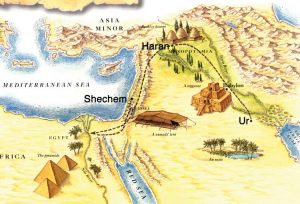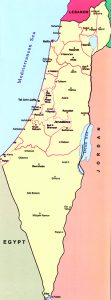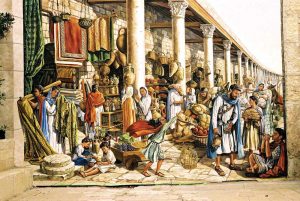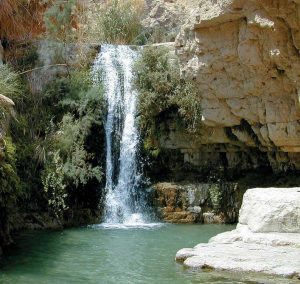
by: Rev. Rebecca J. Brimmer, International President and CEO
In my travels around the world, I have the opportunity to meet Christians from widely diverse church backgrounds. Bridges for Peace is an interdenominational organization, and so we are invited to speak in many different denominations. Fairly often, someone will come up to me and be honestly puzzled as they express the fact that they don’t understand why they should be interested in the nation and people of Israel. In this teaching letter, I want to give you a few thoughts about why all Christians should care about Israel.
 It all started when God chose a man named Abram. “Now the LORD had said to Abram: ‘Get out of your country, from your family and from your father’s house, to a land that I will show you. I will make you a great nation; I will bless you and make your name great; and you shall be a blessing. I will bless those who bless you, and I will curse him who curses you; and in you all the families of the earth shall be blessed” (Genesis 12:1–3).
It all started when God chose a man named Abram. “Now the LORD had said to Abram: ‘Get out of your country, from your family and from your father’s house, to a land that I will show you. I will make you a great nation; I will bless you and make your name great; and you shall be a blessing. I will bless those who bless you, and I will curse him who curses you; and in you all the families of the earth shall be blessed” (Genesis 12:1–3).
Abram (later changed to Abraham) was living at a time when many gods were worshipped. There were gods of fertility, rain, fire, and war. You prayed to whichever god could give you what you needed. If you had good rain, then the god of rain was looking favorably on you, and if you had drought, it was an indication that you had displeased the god. Often these gods were evaluated by how well they treated the people who prayed to them.
Very little is known about Abram’s early upbringing, but it is quite clear that Abram lived in a pagan, idol-worshipping society. One of the many rabbinic tales about Abram says that Abram’s father Terah was an idol maker. The tale recounts how Abram became disillusioned with these idols and chose to follow God. However, the Bible tells it a little differently. Clearly, God chose Abram. I am certain from Abram’s subsequent actions that his encounter with God was powerful. Abraham listened to God’s words and followed them obediently. It is no small thing to leave your family, your home, your country, and move across the world. I know! My husband and I did that very thing when we moved to Israel. But, we had the advantage of knowing where we were going. Abram obediently packed up his possessions, his wife, his nephew, and other persons they had accumulated, and started off toward a land that God said He would show him. Abram was a man of faith, who God later called, “My friend.”
“But you, Israel, are My servant, Jacob whom I have chosen, the descendants of Abraham My friend. You whom I have taken from the ends of the earth, and called from its farthest regions, and said to you, ‘You are My servant, I have chosen you and have not cast you away: fear not, for I am with you; be not dismayed, for I am your God. I will strengthen you, yes, I will help you, I will uphold you with My righteous right hand’” (Isaiah 41:8–10). “And the Scripture was fulfilled which says, ‘Abraham believed God, and it was accounted to him for righteousness.’ And he was called the friend of God” (James 2:23).
It is not hard for us, as Christians, to accept the idea that God would reach out to a man. After all, He reached out to us. What is perhaps more difficult to understand is why God made Abram move to a distant land.
Why did God choose the Land of Israel, or Canaan as it was called at that time? Why couldn’t Abram have just worshipped God in his homeland? God called Abram and promised to bless the world through him, and in order to do that effectively God had to move Abram to the crossroads of the ancient world. It was God’s intention that the polytheistic world would come to know Him, the Almighty Creator, the only true God. So, He took a man of faith, who was willing to obey, even when he didn’t understand, and He put him right in the middle of the ancient world. The Land of Israel is not very big. It only takes about seven hours to drive from the farthest point in the north to Eilat, the southernmost city on the Red Sea. From east to west, it only takes about two hours at its widest point.
 But, this little sliver of land was the land bridge between the continents of the ancient world. In fact, antique maps often show Jerusalem and Israel as the center of the world. There are inhospitable deserts to the east, and the Mediterranean Sea to the west. The Via Maris (Way of the Sea) was the main super highway of the ancient world. Armies marched through it on their way to war, and traders with their camel trains passed through on their way to distant marketplaces. In Bible days, the pace was much slower than today with our air-travel lifestyle. So, a journey, which takes us seven hours in our car, took many days on foot or by camel. On their way through the Land, they learned about this people who worshipped one God, they heard about His miraculous ways, and they had the opportunity to be introduced to the one true God. He was revealing Himself and His character to the world.
But, this little sliver of land was the land bridge between the continents of the ancient world. In fact, antique maps often show Jerusalem and Israel as the center of the world. There are inhospitable deserts to the east, and the Mediterranean Sea to the west. The Via Maris (Way of the Sea) was the main super highway of the ancient world. Armies marched through it on their way to war, and traders with their camel trains passed through on their way to distant marketplaces. In Bible days, the pace was much slower than today with our air-travel lifestyle. So, a journey, which takes us seven hours in our car, took many days on foot or by camel. On their way through the Land, they learned about this people who worshipped one God, they heard about His miraculous ways, and they had the opportunity to be introduced to the one true God. He was revealing Himself and His character to the world.
So, the first reason I think we as Christians should care about Israel, is that God chose this place as the stage on which to reveal Himself to the world. And He chose the Jewish people to be the ones who would tell His story. The Bible was written by Jewish men inspired by the Holy Spirit. Today, thousands of miles (or kilometers) away and thousands of years removed from the events of the Bible, billions of people are impacted spiritually and, in turn, influence their societies and cultures with the values and principles written on those holy pages.
The Bible has often been described as God’s love letter to mankind. As I read the Bible, I see many instances of God’s great love for the descendants of Abraham, his friend.
“Blessed be the LORD your God, who delighted in you, setting you on the throne of Israel! Because the LORD has loved Israel forever, therefore He made you king, to do justice and righteousness” (1 Kings 10:9).
“He has remembered His mercy and His faithfulness to the house of Israel; all the ends of the earth have seen the salvation of our God” (Psalm 98:3).
“For the LORD has chosen Jacob for Himself, Israel for His special treasure” (Psalm 135:4).
“Do not fear; Zion, let not your hands be weak. The LORD your God in your midst, the Mighty One, will save; He will rejoice over you with gladness, He will quiet you with His love, He will rejoice over you with singing” (Zephaniah 3:16–17).
In Experiencing God, author Henry Blackaby says that we should find out what God is doing and ask Him how He wants us involved. It is always surprising to me to find Christians who love God and read the Bible and yet don’t understand His commitment to Israel and ongoing interest in the Jewish people.
I wonder sometimes how many of us will actually be surprised when we meet Yeshua (Jesus) face to face. We all grow up with pictures of Yeshua on our walls or on the walls of our churches. Most of the artistic renderings picture someone who looks European. Yeshua probably didn’t look like that. He was a Jew, a Semite, and probably had a darker complexion, dark (maybe curly) hair, and dark eyes. The pictures also make Him look kind of weak. I don’t believe there was anything weak about Him. He walked from place to place throughout the Land with His disciples. The terrain of Israel is not made for easy walking; it is often very hilly and rocky, with high and low elevations. The walk from the Galilee to Jerusalem was an arduous hike. Additionally, He was a carpenter. The Greek word tekton (τ?κτων) translated carpenter in the Bible can also be translated builder or craftsman. Some believe it is possible that Yeshua worked in stone rather than wood, since that was much more common in the region. Either way, they were both trades which required strength and skill. I think it is likely that Yeshua was a muscular man—a real man’s man, nothing wimpy about Him!
 Consider this, Yeshua is the only person in all of history who chose what family He would be born into, and He chose to be a Jew. Another fact that few of us stop to think about is that Yeshua was never identified as a Christian. He was born into a pious Jewish family, lived His life observing Torah (Gen.–Deut.), wore a prayer shawl, worshipped in synagogues and the Temple, and lived among Jewish people. He never entered a church.
Consider this, Yeshua is the only person in all of history who chose what family He would be born into, and He chose to be a Jew. Another fact that few of us stop to think about is that Yeshua was never identified as a Christian. He was born into a pious Jewish family, lived His life observing Torah (Gen.–Deut.), wore a prayer shawl, worshipped in synagogues and the Temple, and lived among Jewish people. He never entered a church.
My father Dr. David Allen Lewis (of blessed memory) used to ask Christians this question: “How can you say you love Jesus, a Jew, and hate the Jewish people?” I believe it is a valid question. When a person gets married, they not only are blessed with a spouse, they are blessed with new family members as well. Your husband’s parents will be your children’s grandparents!! No newlywed wife tells her husband, “Honey, I love you, but I just don’t care for your family. I don’t really want to be with them very often.” If she did, her husband would have to wonder if she really loved him. Loving your spouse means you learn to love those he loves. Surely if we love our Jewish Messiah (Christ), we will choose to be interested in His interests and to love those He loves, including His natural family, the Jewish people.
As I mentioned earlier, Israel is the stage upon which God chose to reveal Himself to the world, as the one true God. I haven’t found any Christians who deny this fact historically. Many, however, don’t seem to recognize that Israel is still significant to God. Living as we do, 2,000 years after the events of the Newer Testament, and around 3,000 years after the events of the Older Testament, Israel often seems irrelevant to Christians. Yet, God is still revealing Himself to the world as He fulfills His ancient promises to Israel. God is proving to the world that He is a faithful, covenant-keeping God who can be trusted to keep His word because of His faithfulness, regardless of the worthiness of the other.
“When they came to the nations, wherever they went, they profaned My holy name—when they said of them, ‘These are the people of the LORD, and yet they have gone out of His land.’ But I had concern for My holy name, which the house of Israel had profaned among the nations wherever they went. Therefore say to the house of Israel, ‘Thus says the Lord GOD: “I do not do this for your sake, O house of Israel, but for My holy name’s sake, which you have profaned among the nations wherever you went. And I will sanctify My great name, which has been profaned among the nations, which you have profaned in their midst; and the nations shall know that I am the LORD,” says the Lord GOD, “when I am hallowed in you before their eyes”’” (Ezekiel 36:20–23).
Let’s look at a couple of ways God is revealing Himself today through Israel and the Jewish people.
God Promised to Restore the Land: “But you, O mountains of Israel, you shall shoot forth your branches and yield your fruit to My people Israel, for they are about to come. For indeed I am for you, and I will turn to you, and you shall be tilled and sown…The desolate land shall be tilled instead of lying desolate in the sight of all who pass by. So they will say, ‘This land that was desolate has become like the garden of Eden; and the wasted, desolate, and ruined cities are now fortified and inhabited’” (Ezekiel 36:8–9, 34–35). Even as little as 100 years ago, it seemed impossible for this passage to be fulfilled. Palestine (a name given to the Land of Israel as early as the fifth century AD to 1948) had become desolate after centuries of neglect under the oversight of Turkish landlords. Travelers to the area were quite dismayed by the Land of the Bible. The following are some of their testimonies.
In Innocents Abroad, Mark Twain describes the treeless desolation of the land of Palestine in the 1800s. He calls it a “blistering, naked, treeless land.” He calls the villages “ugly, cramped, squalid, uncomfortable, and filthy.” Another line reads “solitude to make one dreary; un-peopled deserts, and rusty mounds of barrenness that never, never, never do shake the glare from their harsh outlines.” One particularly descriptive sentence reads, “This stupid village of Tiberias, slumbering under its six funereal plumes of palms; yonder desolate declivity where the swine of the miracle ran down into the sea and doubtless thought it was better to swallow a devil or two and get drowned into the bargain than have to live longer in such a place.”

www.israelimages.com
The Jewish people started returning to the Land in the 1800s. They began to reclaim the Land in a restoration process that continues to the present day. They drained malaria-filled swamps, planted millions of trees, irrigated desert lands, and planted the fields, growing more than enough for the needs of the inhabitants. The Land that Ezekiel once called the “glory of all lands” (20:6) is once again being restored to its former glory.Nachmanides, a great Jewish scholar, visited in 1267 and described Jerusalem as “deserted and laid waste and that Judea was more destitute than Galilee.” George Sandys, son of Edwin Sandys, archbishop of York, was an English traveler, colonist, and poet. He reported in 1610 that the “land is bare of trees. The country is a vast empty ruin.” Some eyewitness accounts say that there were less than 1,000 trees in the Land and that there were not enough people living in the Land to till it! Yet, today, when you travel to Israel, you will see a different reality. The Land is being restored to its former beauty as prophesied. “I will open rivers in desolate heights, and fountains in the midst of the valleys; I will make the wilderness a pool of water; and the dry land springs of water. I will plant in the wilderness the cedar and the acacia tree, the myrtle and the oil tree; I will set in the desert the cypress tree and the pine and the box tree together; that they may see and know, and consider and understand together, that the hand of the LORD has done this, and the Holy One of Israel has created it” (Isaiah 41:18–20).

Picture by Jewish Agency
God Promised to Bring the Jewish People Back: The prophets of Israel foretold a day when the Jewish people would come back to their ancient homeland from the countries of their dispersal.
“‘I will bring back the captives of My people Israel; they shall build the waste cites and inhabit them; they shall plant vineyards and drink wine from them; they shall also make gardens and eat fruit from them. I will plant them in their land, and no longer shall they be pulled up from the land that I have given them,’ says the LORD your God” (Amos 9:14–15).
“When I have brought them back from the peoples and gathered them out of their enemies’ lands, and I am hallowed in them in the sight of many nations, then they shall know that I am the LORD their God, who sent them into captivity among the nations, but also brought them back to their land, and left none of them captive any longer” (Ezekiel 39:27–28).
Today, over six million Jews live in Israel. Over three million of them came as immigrants, and many more are the children or grandchildren of immigrants. They continue to come from the countries of the world. It is estimated that there are 14 million Jewish people worldwide with the largest group residing in Israel for the first time in nearly 2,000 years. God is in the process of fulfilling His promises made through the prophets to bring His people home to Israel.
“Sing with gladness for Jacob, and shout among the chief of the nations; proclaim, give praise, and say, ‘Oh LORD, save Your people, the remnant of Israel’” (Jeremiah 31:7). Whenever you read the name “Jacob” in the Scriptures, it always refers to the man Jacob or the Jewish people—never the Church. So I believe God is telling Christians everywhere to do these things for the Jewish people.
At Bridges for Peace, we have many ways Christians can become involved with Israel and God’s plan to show His character and glory to the world. I hope you are actively standing with Israel. If not, check out our Web site and choose a way to partner with the Lord as He shows the world He is God on the stage of Israel.
Blackaby, Henry. Experiencing God. Nashville, TN: Broadman and Holman Publishers,
1989.
Brimmer, Rebecca J. Israel and the Church: God’s Road Map. Jerusalem: Bridges for Peace, 2006.
Falk, Harvey. Jesus, the Pharisee, a New Look at the Jewishness of Jesus. Eugene, OR:
Wipf and Stock Publishers, 2003.
Flusser, David. Jesus. Carlsbad, CA: Magnus Press, 1998.
Friedman, David. They Loved the Torah: What Yeshua’s First Followers Thought
about the Torah. Clarksville, MD: Messianic Jewish Publishers, 2001.
Lewis, David. Can Israel Survive in a Hostile World? Green Forest, AR: New Leaf Press,
1994.
Twain, Mark. Innocents Abroad. 1869.
Wikipedia, online encyclopedia, www.wikipedia.org
Wilson, Marvin. Our Father Abraham: Jewish Roots of the Christian Faith. Grand Rapids,
MI: William B. Eerdmans Publishing, 1989.
All logos and trademarks in this site are property of their respective owner. All other materials are property of Bridges for Peace. Copyright © 2025.
Website Site Design by J-Town Internet Services Ltd. - Based in Jerusalem and Serving the World.